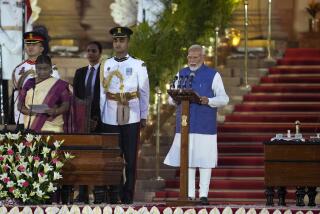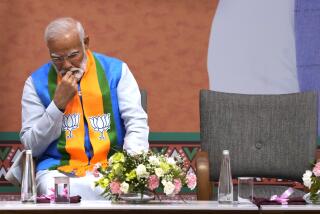Controversial Indian politician gets boost from election win
NEW DELHI -- One of India’s most controversial politicians won his third term as chief minister of western Gujarat state Thursday, bolstering his hopes of becoming prime minister as early as 2014.
Bharatiya Janata Party officials were cagey about Narendra Modi’s national plans after the Hindu populist led the party to victory in Gujarat, securing 115 of the state legislature’s 182 seats.
“This may be an interesting topic from the media’s point of view, but we will take a decision at the appropriate time,” party national head Arun Jaitley said Thursday, adding: “This is an emphatic win and he has won for the third time in a row.”
The party lost in Himachal Pradesh state elections announced Thursday, however, securing 26 of 62 seats compared to 36 seats for Congress, which is the ruling party nationwide.
In Gujarat, one of India’s most pro-business states, Modi is credited with improving infrastructure, offering attractive corporate tax incentives and streamlining red tape, helping make “Vibrant Gujarat” -- as his marketing campaigns calls it -- a darling of foreign investors.
The state’s annual economic growth has remained around 10% for much of the past decade. Manufacturing accounts for 28% of the state economy, nearly double the average for other states. Gujarat’s literacy rate is among India’s highest and its poverty rate among the lowest.
But Modi, 62, carries some heavy baggage that could make a bid to become prime minister problematic. Most notable among the issues: his role in the state’s 2002 riots when, critics say, he either stood by as Hindu mobs attacked Muslims or actively supported their efforts. He has long denied any wrongdoing.
The 2002 sectarian violence, among India’s deadliest in recent memory, was sparked by a train carriage that caught fire, killing about 60 people, mostly Hindu pilgrims. Hindu mobs blamed Muslims for the fire, torching neighborhoods, looting property and hunting down residents with pipes and stones. At least 1,000 people were slain, most of them Muslims.
After the 2002 riots, the U.S. and Britain authorities denied Modi visas and limited official contact, though in recent months they have softened their stance.
Modi has declined to admit responsibility, apologize or explain in detail his role. In April, a national investigative team cleared him of wrongdoing. Nine major cases are working their way through India’s Supreme Court or have recently wrapped up, leading to several dozen convictions, including that of a top Modi aide.
“The 2002 issue is definitely a big problem for his national ambitions,” said R.B. Sreekumar, a retired policeman posted in the riot-affected areas in 2002 who maintains that Modi helped Hindu rioters. “India is secular, with a large Muslim population, and politics is in the hands of minorities. The ‘Hindu republic’ he favors is not happening.”
Any bid by Modi for prime minister would face competition from others in the Bharatiya Janata Party, including longtime party stalwart Lal Krishna Advani; former Delhi chief minister Sushma Swaraj, and Jaitley.
Many insiders also are reportedly wary of Modi after watching him upend the party structure in Gujarat, replacing established players with chosen allies. Some also question whether his statewide popularity translates.
“It’s no hidden secret that he has prime minister ambitions,” said Sankarshan Thakur, roving editor with the Telegraph newspaper. “But he has no proof he can be a leader outside Gujarat.”
Modi is seen even by critics as hard-working and corruption-free, with a reluctance to delegate responsibility: he is also the state’s petrochemicals, home, ports, energy, information and broadcasting ministers.
“He’s something of a control freak,” said Aakar Patel, a columnist at Mint, a daily business newspaper. “He sees himself in Messianic terms, believes he’s the only one who can set this country straight. He’s a tyrant in the classic Platonic sense.”
In any national contest, Modi probably would brush up against Rahul Gandhi, heir apparent of the Congress party and scion of the Nehru-Gandhi political dynasty. Congress offered a raft of freebies to Gujarat voters in a desperate attempt to gain traction against Modi, including free houses, land, loans, computer tablets, medicine and cancer treatment along with job guarantees, but secured just 61 seats.
Gandhi, meanwhile, kept a low profile in Gujarat, arguably chagrined by his party’s poor showing after he campaigned hard on its behalf in March’s Uttar Pradesh election.
Critics say Modi’s Gujarat policies favor the middle and upper classes at the expense of lower classes, castes and tribal groups crucial in any national contest. While Muslims make up 9% of Gujarat voters, for example, they are 20% nationwide. He’s also received too much credit, some add, for the accomplishments of the Gujarati people, long seen as industrious and entrepreneurial.
Swapan Dasgupta, a political analyst and newspaper columnist, counters that standing by and letting business function is in itself an accomplishment in India, where government has a history of meddling. And even if the state’s middle class has benefited inordinately, he added, lower socioeconomic groups have also received significant advantage from the state’s regular electricity and water supplies and decent roads.
“Modi’s been able to deliver,” Dasgupta said. “That’s not necessarily the case elsewhere in India.”
Sunil Makwana, 38, an academic in Gujarat whose work takes him to many Indian states, said the contrast is dramatic.
“I believe 100% that Modi will be the prime minister one day, although maybe not 2014,” he said. “Riots happen everywhere in India, so what? Gujarat has moved on. Gujarat is indeed shining because of him.”
ALSO:
Putin further distances Russia from Syria’s Assad
Latin American nations among the most upbeat, poll finds
U.N. seeks $1.5 billion to help Syria residents and refugees
More to Read
Sign up for Essential California
The most important California stories and recommendations in your inbox every morning.
You may occasionally receive promotional content from the Los Angeles Times.










